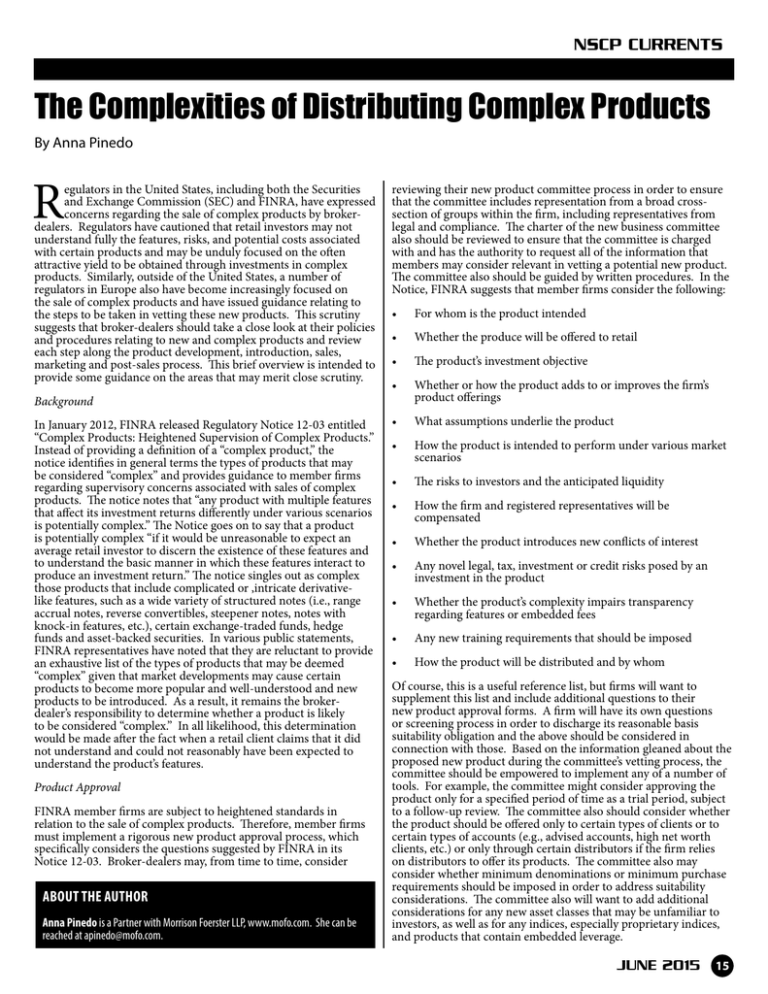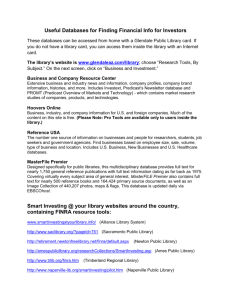The Complexities of Distributing Complex Products
advertisement

NSCP CURRENTS The Complexities of Distributing Complex Products By Anna Pinedo R egulators in the United States, including both the Securities and Exchange Commission (SEC) and FINRA, have expressed concerns regarding the sale of complex products by brokerdealers. Regulators have cautioned that retail investors may not understand fully the features, risks, and potential costs associated with certain products and may be unduly focused on the often attractive yield to be obtained through investments in complex products. Similarly, outside of the United States, a number of regulators in Europe also have become increasingly focused on the sale of complex products and have issued guidance relating to the steps to be taken in vetting these new products. This scrutiny suggests that broker-dealers should take a close look at their policies and procedures relating to new and complex products and review each step along the product development, introduction, sales, marketing and post-sales process. This brief overview is intended to provide some guidance on the areas that may merit close scrutiny. Background In January 2012, FINRA released Regulatory Notice 12-03 entitled “Complex Products: Heightened Supervision of Complex Products.” Instead of providing a definition of a “complex product,” the notice identifies in general terms the types of products that may be considered “complex” and provides guidance to member firms regarding supervisory concerns associated with sales of complex products. The notice notes that “any product with multiple features that affect its investment returns differently under various scenarios is potentially complex.” The Notice goes on to say that a product is potentially complex “if it would be unreasonable to expect an average retail investor to discern the existence of these features and to understand the basic manner in which these features interact to produce an investment return.” The notice singles out as complex those products that include complicated or ,intricate derivativelike features, such as a wide variety of structured notes (i.e., range accrual notes, reverse convertibles, steepener notes, notes with knock-in features, etc.), certain exchange-traded funds, hedge funds and asset-backed securities. In various public statements, FINRA representatives have noted that they are reluctant to provide an exhaustive list of the types of products that may be deemed “complex” given that market developments may cause certain products to become more popular and well-understood and new products to be introduced. As a result, it remains the brokerdealer’s responsibility to determine whether a product is likely to be considered “complex.” In all likelihood, this determination would be made after the fact when a retail client claims that it did not understand and could not reasonably have been expected to understand the product’s features. Product Approval FINRA member firms are subject to heightened standards in relation to the sale of complex products. Therefore, member firms must implement a rigorous new product approval process, which specifically considers the questions suggested by FINRA in its Notice 12-03. Broker-dealers may, from time to time, consider ABOUT THE AUTHOR Anna Pinedo is a Partner with Morrison Foerster LLP, www.mofo.com. She can be reached at apinedo@mofo.com. reviewing their new product committee process in order to ensure that the committee includes representation from a broad crosssection of groups within the firm, including representatives from legal and compliance. The charter of the new business committee also should be reviewed to ensure that the committee is charged with and has the authority to request all of the information that members may consider relevant in vetting a potential new product. The committee also should be guided by written procedures. In the Notice, FINRA suggests that member firms consider the following: • For whom is the product intended • Whether the produce will be offered to retail • The product’s investment objective • Whether or how the product adds to or improves the firm’s product offerings • What assumptions underlie the product • How the product is intended to perform under various market scenarios • The risks to investors and the anticipated liquidity • How the firm and registered representatives will be compensated • Whether the product introduces new conflicts of interest • Any novel legal, tax, investment or credit risks posed by an investment in the product • Whether the product’s complexity impairs transparency regarding features or embedded fees • Any new training requirements that should be imposed • How the product will be distributed and by whom Of course, this is a useful reference list, but firms will want to supplement this list and include additional questions to their new product approval forms. A firm will have its own questions or screening process in order to discharge its reasonable basis suitability obligation and the above should be considered in connection with those. Based on the information gleaned about the proposed new product during the committee’s vetting process, the committee should be empowered to implement any of a number of tools. For example, the committee might consider approving the product only for a specified period of time as a trial period, subject to a follow-up review. The committee also should consider whether the product should be offered only to certain types of clients or to certain types of accounts (e.g., advised accounts, high net worth clients, etc.) or only through certain distributors if the firm relies on distributors to offer its products. The committee also may consider whether minimum denominations or minimum purchase requirements should be imposed in order to address suitability considerations. The committee also will want to add additional considerations for any new asset classes that may be unfamiliar to investors, as well as for any indices, especially proprietary indices, and products that contain embedded leverage. JUNE 2015 15 NSCP CURRENTS Training Requirements The Notice reminds firms of their training obligations. Prior to commencing sales of any complex product, registered representatives should receive appropriate training. At the very least, a registered representative that is charged with selling a complex product must: understand the features and risks associated with the product; the payoff structure and the contingencies that may be associated with potential payments; the reference asset; the historic performance of the reference asset; any interdependencies in the performance of the reference asset and other variables that would affect the payoff; the expected performance of the product; any assumptions regarding the market conditions that would affect performance; the costs associated with the product; and whether there are similar products available to the customer. FINRA has brought a number of disciplinary actions involving complex products. Many of these actions involve sales practice violations, such as misselling, which can be traced to a lack of understanding on the part of the sales person of the product’s features. Effective training can help to mitigate the risk of misselling. Any training materials should be carefully reviewed in order to make certain that the materials are fair and balanced and adequately describe the risks associated with the product. Suitability Assessments Rule 2301 requires that in connection with recommending to the customer the purchase or sale of a security, the broker have reasonable grounds for believing that the recommendation is suitable for the customer based on the facts disclosed by the customer to the broker about the customer’s financial needs and objectives. Once a product has been determined to be acceptable in light of the broker’s reasonable basis suitability obligation, the broker must be in a position where it can discharge its customerspecific and quantitative suitability obligations. Again, FINRA has emphasized that member firms should adopt robust suitability policies and procedures that address complex products. A firm may consider, as suggested by Notice 5-59 and Notice 12-03, limiting sales of complex products to accounts that are approved for options trading. Otherwise, firms can develop other procedures designed to ensure that complex products are sold to customers with the financial sophistication to understand the product features and risks. Notice 12-03 advises that a registered representative who intends to recommend a complex product should discuss with the customer the product features, the product’s anticipated returns under different market conditions, the risks and possible benefits, the costs, and the circumstances under which the performance may vary. After this discussion, the registered representative should evaluate whether the customer understands the basic features of the product. In various other notices regarding specific products, FINRA has highlighted specific risks that may be posed by such products. In enforcement actions, FINRA has found that in connection with complex products certain member firms: did not have adequate supervisory systems and procedures to detect and prevent unsuitable sales, failed to provide registered representatives with sufficient training that would permit them to identify whether the recommended products were consistent with the customers’ investment objectives, failed to identify excessive concentration of, or inappropriate trading of, complex products in client accounts, and lacked systems to prohibit purchases on margin. Supervisory Systems Given the special issues posed by complex products, member firms should ensure that their supervisory systems are adequate. For example, in FINRA enforcement actions, FINRA determined that 16 JUNE 2015 certain firms did not have the capability to generate exception reports that captured trades in certain complex products. Similarly, another firm did not have in place a system that would permit the firm to monitor concentration of a particular type of product, reverse convertible notes, in client accounts. Conflicts of Interest FINRA has been particularly focused on conflicts of interests. In its 2013 report on conflicts of interest, FINRA noted that firms must address actual or potential conflicts of interest during the new product review process, as well as in subsequent postapproval reviews and determine whether conflicts (if any) can be mitigated or eliminated and how these conflicts will be disclosed to investors. The report comments specifically on the policies that firms implement with respect to conducting diligence in respect of any distributors (“Know Your Distributor” policies) and the extent to which the distributors have appropriate policies and procedures to address complex product sales. The report also discusses the conflicts that may exist in structured products due to the roles of the parties, such as, for example, when the broker-dealer or its affiliate acts as calculation agent for the relevant product, or for an underlying index. Post-Approval Review A member firm’s responsibilities continue through to a post-sales review process. The Notice reminded member firms that they should establish post-approval review processes in respect of new and complex products. The post-sale review process is intended to provide an opportunity for the firm to assess whether a product is performing as expected. A firm should design policies and procedures for the post-approval review that take into account the following factors, among others: any customer complaints received regarding the product, any regulatory developments that would affect the product, any questions received about the product from distributors or registered representatives that might suggest that additional training would be useful, the adequacy of disclosures used in marketing the product, the distribution channel for the product, the type of investors to whom the product is offered, the product’s performance and the extent to which actual performance is consistent with expectations, competitor products or other products that may provide similar opportunities, costs and fees associated with the product, and any conflicts of interest that have presented themselves in respect of the product. Conclusion Although most of the FINRA actions to date have focused on misselling, it is important to recognize that effective policies and procedures can mitigate this possibility. It is reasonable to anticipate that regulators will continue to focus on complex products and review member firms’ policies and procedures related to the vetting and sales of these products. As a result, it is important to acknowledge that the greater the complexity of a proposed product (at least in the eyes of a prospective investor), the greater the scrutiny that the legal and compliance groups should apply to each stage of the product’s life.




